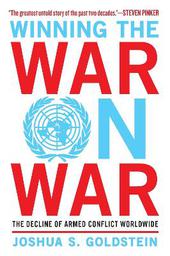
|
Winning the War on War: The Decline of Armed Conflict Worldwide
Paperback / softback
Main Details
| Title |
Winning the War on War: The Decline of Armed Conflict Worldwide
|
| Authors and Contributors |
By (author) Joshua S. Goldstein
|
| Physical Properties |
| Format:Paperback / softback | | Pages:400 | | Dimensions(mm): Height 203,Width 142 |
|
| Category/Genre | True War and Combat Stories |
|---|
| ISBN/Barcode |
9780452298590
|
| Classifications | Dewey:355.02 |
|---|
| Audience | |
|---|
|
Publishing Details |
| Publisher |
Penguin Putnam Inc
|
| Imprint |
New American Library
|
| Publication Date |
31 July 2012 |
| Publication Country |
United States
|
Description
"The most important political book of the year."-Gregg Easterbrook, author ofThe Progress Paradox Everyone knows- wars are getting worse, more civilians are dying, and peacemaking achieves nothing, right? Wrong. Despite all the bad-news headlines, peacekeeping is working. Fewer wars are starting, more are ending, and those that remain are smaller and more localized. But peace doesn't just happen; it needs to be put into effect. Moreover, understanding the global decline in armed conflict is crucial as America shifts to an era of lower military budgets and operations. Preeminent scholar of international relations, Joshua Goldstein, definitively illustrates how decades of effort by humanitarian aid agencies, popular movements-and especially the United Nations-have made a measureable difference in reducing violence in our times. Goldstein shows how we can continue building on these inspiring achievements to keep winning the war on war. This updated and revised edition includes more information on a post-9-11 world, and is a perfect compendium for those wishing to learn more about the United States' armed conflicts in Iraq and Afghanistan.
Author Biography
Joshua Goldstein is an interdisciplinary scholar of war and an awarding-winning professor at the School of International Service at American University. He has written for The American Political Science Review, Journal of Conflict Resolution, and International Studies Quarterly, as well as Op Ed pieces in The New York Times and the Christian Science Monitor. He's been on ABC Nightline, NBC and CNN television, and BBC and NPR radio. He has won a MacArthur Foundation Individual Research and Writing Grant, the International Studies Association's Karl Deutsch Award for research, and the American Political Science Association's Victoria Schuck Award. The National Science Foundation has funded his research. Goldstein received his M.S. and Ph.D. in political science from MIT. He has taught at Yale University, Brown University, the University of Massachusetts, and the University of Maryland. As well as his current affiliation with American University in Washington, DC, he is Research Scholar in the Political Science Dept. at the University of Massachusetts, Amherst and the Nonresident Sadat Senior Fellow at theUniversity of Maryland.
Reviews"Reveals the greatest untold story of the past two decades-that contrary to popular impressions, war has become substantially rarer and less dangerous... This book could change the understanding of policy makers, opinion leaders, and a wide readership."-Steven Pinker, professor of psychology, Harvard College; bestselling author of The Blank Slate "Does what no other book has attempted, providing a synoptic view, and narrative, of the slow but successful evolution of UN peacekeeping. It takes an unusual and unorthodox approach that works very well indeed."-Paul Kennedy, professor of history, Yale University; author of The Rise and Fall of the Great Powers "A novel, highly informative, and exceedingly valuable book."-David Hamburg, President Emeritus, Carnegie Corporation of New York; former president, AAAS "A highly readable account of the nature and problems of peacekeeping... an important contribution to public understanding of international affairs."-Brian Urquhart, former Undersecretary-General of the UN; author of Ralph Bunche: An American Life and Hammarskjoeld "The untold story of how we seem to be winning the long-term fight against war, and why. His book should be required reading for policymakers and the media."-Nils Petter Gleditsch, Peace Research Institute Oslo "A surprising study that suggests warfare is decreasing .... Optimistic, useful history of diplomacy as counterweight to brutality."-Kirkus "The most important political book of the year."-Gregg Easterbrook, author of The Progress Paradox
|